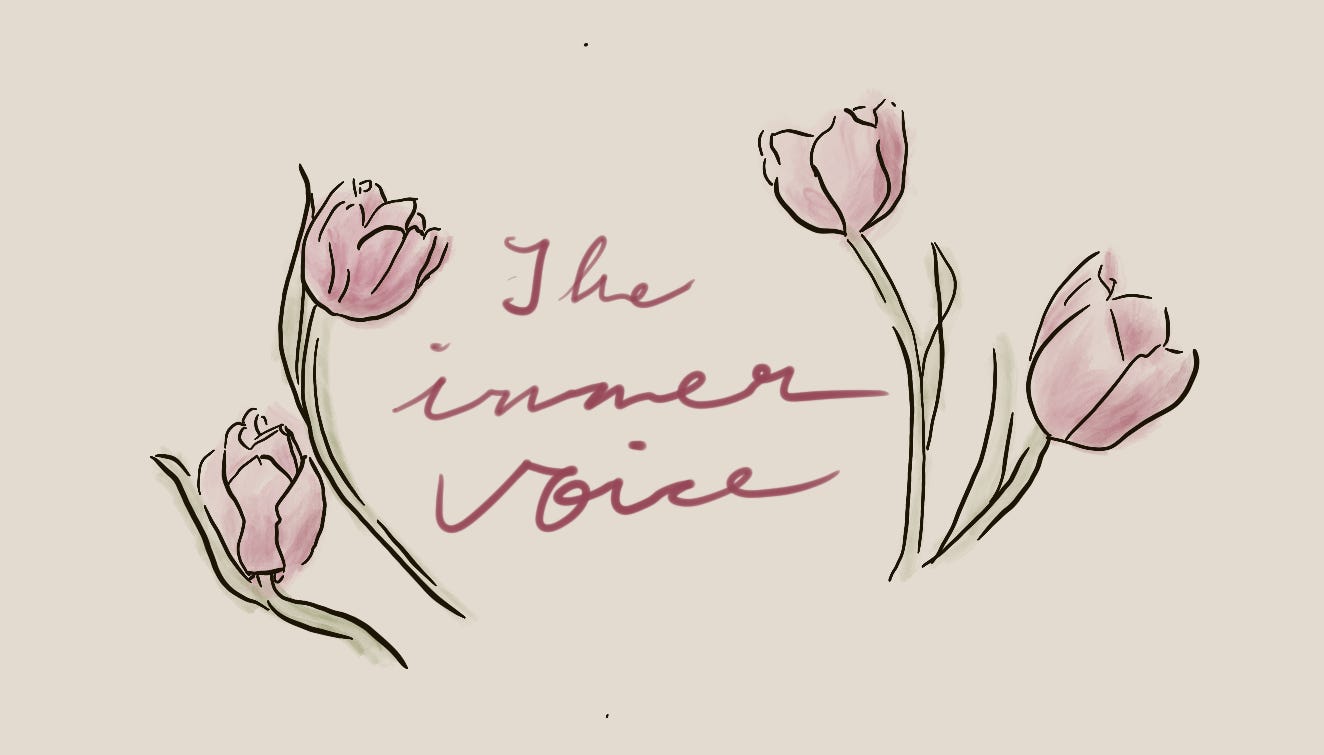Inner voices
How I learned to be kinder to myself, and how it's changed my life. Plus resources for those who, like me, struggle with self-flagellation.
Welcome to Winter, Issue #4 of Making Time. Each week, I share a seasonal perspective on the creative process. This month, my theme is Structure. If you’d like to follow along on this year-long experiment, you can subscribe for free.
I have a cousin who does not have an inner monologue. We were having a family gathering at our house when her sister said, incredulously, “Did you know that B doesn’t have a voice inside her head?”
B shrugged. To her, there was nothing incredible about it. It’s just how her brain has always worked. We grilled her.
No running commentary?
No intrusive critical thoughts?
No constant stream of boring, mundane observations?
Nope, none.
Apparently, there is a subset of people whose minds work this way. There’s also quite a bit of variation in how people experience the “inner voice”, including people who experience it visually, abstractly, or as a distinct character in their minds.
For me, it’s a never-ending stream of words and sentences. I don’t think there’s really an auditory quality to it. I don’t exactly “hear” the voice, I just seem to experience it quietly. Sometimes, the words are jumbled and repetitive, especially when I’m trying to write or think of what I’m about to say. But usually, they are clear, simple, and dull. As Sam Harris has said, “It’s as though you’ve been kidnapped by the most boring person on earth and just forced to listen to this guy all day long.”
Boring is fine, I can deal with boring. But sometimes, this voice turns vicious. It can be harsh and judgmental, both of myself and others. It might tell me that I’m ugly, or point out all the signs of ageing on my face or body. It might inform me that I’ve said something really stupid and ought to be embarrassed. Or maybe it’ll let me remind me of some past failure and discourage me from trying again.
This is often referred to as the “inner critic” and for basically my entire life, I have identified with this voice. What I mean by that is that the voice represented by thoughts, and my thoughts were me. Therefore, the voice was telling the truth, or at least the truth as I perceived it in that moment.
But something has changed.
The Realization
The other day, I was working on a video project on my own. I blocked out the whole day, but there was so much to do. I had to learn to use some new equipment, figure out how to write an outline in a completely new context, make the actual project I was trying to film, film it all myself – it was a lot. I told myself I probably would not be able to do it in a day, but a part of me really hoped I could.
Of course, by the end of the day, I’d only finished about half of it. The voice started up: “You should keep working. You should have been able to finish this, or you’re just going to get further behind. This probably won’t even turn out very well, because you have no idea what you’re doing. Maybe this wasn’t a good idea to begin with.”
But then, another voice, calm and quiet. “It’s ok, you worked hard today and look at everything you got done in just a few hours! It’s time to put it away and come back later.”
I wasn’t actively trying to push the negative thoughts away or combat them. It just happened. That is the amazing part. That night at dinner, I told Kenn, “You know, I think I’m much nicer to myself than I used to be.”
So what changed?
It’s possible that this new, kinder voice is just a product of maturity. One of the benefits of getting older is not taking things so damn seriously all the time.
But I also think there are specific ideas and practices that have helped me in the last few years to transform the way I think in a way I was never able to before. Those are:
Recognizing the multiple voices in my head. I now believe that we all carry around at least two very distinct ways of experiencing the world, possibly related to the right/left brain division. Neither is bad. Even the inner critic is not bad, it is simply trying to prevent pain. It’s worth listening to sometimes. The danger comes when this voice takes over and drowns out everything else.
I learned to use the practices of Mindful Self-Compassion. This is a set of practices developed by Dr. Kristin Neff, and you can learn more about it in her book or on the website. The important thing is that it isn’t about building self-esteem, thinking “positive”, or suppressing negative thoughts. Instead, it teaches you to recognize when you’re in a moment of suffering, that it’s totally normal, and that you can be kind to yourself in such moments.
“Suffering” is a big word, but it can be something small like not finishing a video project, or it can be as huge and all-consuming as grief. In fact, my experience has been that those little moments train you for the big moments.
Another benefit is that increasing compassion for myself has made me more compassionate towards other people. If “self-compassion” sounds indulgent to you, like letting yourself off the hook or losing your drive, I can only tell you that it’s been exactly the opposite for me. Learning to treat my pain with kindness frees me up to stop thinking about myself so much, and be kind to others when they’re in difficulty. It’s why compassion towards the self is an important part of Buddhist mettā (loving-kindness) practice. It begins with the self, then radiates out towards others.
If you’re interested in learning more about these, I recommend:
Self-Compassion by Dr. Kristin Neff
Radical Compassion by Tara Brach
I’m curious to know about your experience with your inner voice(s), and especially whether it’s changed over time.
Oh, and if you don’t have a voice in your head, I’d love to hear from you too. My cousin B also happens to be incredibly sweet, kind, and open, so it seems to me like it could be a real gift.
Head, Heart, Hands
Things to make us think, feel, and do.
Maya Angelou our our responsibility to use our creative gifts. I have some related thoughts I’ll likely share next week, but this quote is wonderful: “I believe talent is like electricity. We don’t understand electricity. We use it.”
Niche Museums is a website that helps you find tiny museums near you. The closest one to me (which is not close) is called DEVIL-ish Little Things and I want to go there. (h/t Messy Nessy Chic)
The String of Pearls Theory. What a great framework for creating. I was totally uninterested in seeing this documentary until I read this.
This weird and perplexing history of Transcendental Meditation fascinated me. The quote from Kurt Vonnegut, writing in Esquire about TM, is pretty hilarious. “In other words,” wrote Vonnegut, “[the oppressed person] should quit bitching, begin to meditate, grasp his garters, and float into a commanding position in the marketplace, where transactions are always fair.” It speaks to a certain New Age mentality that persists today.
Wolves are one of my favorite animals. If you like wolves too, you might enjoy this account of living and working in a wolf sanctuary in New Mexico. If you don’t know anything about wolves but would like to, I recommend The Rise of Wolf 8.
I’ve been involved in several conversations about values lately. This lighthearted article explains why it’s so hard to live our values, and how to identify your own.
I made this sesame sunflower crunch this week (doubled the sesame and made a double batch) and used it to top a blood orange bircher muesli. Would recommend if you are a sesame lover.
These ruffly socks are pretty adorable. DROPS has so many great free knitting patterns, well worth a look.
That’s it for me this week! I’d love to hear from you about your own experience with your inner voice(s), and how it’s changed over time.
Thanks for reading Making Time. If you’re new here, you can subscribe for free to receive new posts each week.





I’ve had that critical voice in my head for as long as I can remember. I’ve done a lot of work to change my relationship to it, how I react to it, interpret it. I’ve had some definite progress, but I also feel that self-compassion will be a lifelong challenge, not a thing I’ll just overcome and get past one day.
I remember a quote from Liz Gilbert, who I’m deeply inspired by, which went like this: “Universal compassion is not universal if it doesn’t include you.” I was struck by it, because I definitely find it easier to be compassionate and understanding of others versus myself.
Yet, like most things, knowing all this doesn’t quiet the voice. My best tactic seems to be to laugh at its silliness. The way my voice will tell me one thing and then criticize it in the opposite way, one can only laugh at its ridiculousness sometimes 😅
I look forward to your newsletters so much! Thank you for making this effort for us.
I was raised in a stern religious tradition so my earliest childhood memories include a highly critical, shaming inner voice. I was critical of other people and then my inner voice would scold me for being unkind and judgmental. It was an exhausting cycle! When I started therapy in middle age and began working at gentling my inner voice, I was amazed to discover how quickly and easily the judgmentalism fell away. You really can’t be kind to other people while beating up yourself.